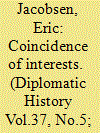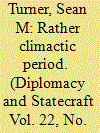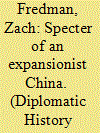|
|
|
Sort Order |
|
|
|
Items / Page
|
|
|
|
|
|
|
| Srl | Item |
| 1 |
ID:
126733


|
|
|
|
|
| Publication |
2013.
|
| Summary/Abstract |
This article will demonstrate that in 1963 the administration of President Kennedy helped create a Ba'th regime in Iraq and then provided it with assistance in order to secure U.S. interests, including access to oil and the containment of both Communism and Arab nationalism. On February 8, 1963, the Ba'th overthrew the dictatorship of General 'Abd-ul-Karim Qasim, an Iraqi nationalist who was seen by both the Eisenhower and Kennedy administrations as a threat to U.S. interests. U.S. policy makers provided the Ba'th regime with military and economic assistance, including sales of military equipment, credits for agricultural surpluses for credit under Public Law 480, and Export-Import Bank loans. Policy makers also encouraged private U.S. businesses to sign contracts with Iraq, supplied the Ba'th regime with ammunition to use against Kurdish rebels, used the Central Intelligence Agency to provide it military equipment, and ignored the Export-Import Bank's policy that prohibited financing arms sales.
|
|
|
|
|
|
|
|
|
|
|
|
|
|
|
|
| 2 |
ID:
111566


|
|
|
|
|
| Publication |
2012.
|
| Summary/Abstract |
In August 1962, the Kennedy Administration secretly sold Hawk missiles to Israel. To the chagrin of many American officials, the arms sale became public one month later. This revelation had a profound impact on Arab-American relations. Alongside the American military intervention in the Lebanon crisis of 1958, the Hawk sale solidified the cultural process in which the United States became an "imperial" power in Arab-Muslim imaginations. Through its perceived sponsorship of Israeli militarism, the United States was deemed guilty of empire by association. Washington's open association with Israel led many to perceive Tel Aviv as an agent of the American Empire.
|
|
|
|
|
|
|
|
|
|
|
|
|
|
|
|
| 3 |
ID:
121163


|
|
|
|
|
| Publication |
2012.
|
| Summary/Abstract |
When the Kennedy administration encountered the nine-year old Bolivian Revolution in 1961, there appeared a very real possibility that La Paz was headed toward the Soviet camp. By incorporating Bolivian fully within the new administration's development program known as the Alliance for Progress, Kennedy officials halted Bolivia's leftward drift and secured it within the US sphere of influence. This paper follows Kennedy officials' initial reaction to Bolivia in January 1961 through to its adoption of an aggressively interventionist policy of military-led development. Seizing on Bolivian leaders' interest in rapid modernization, Washington employed seemingly apolitical developmental theories for political, even imperial, ends. While failing at "development," the Kennedy administration's militarized developmental intervention succeeded at de-Communizing the Bolivian Revolution and reversing its neutralist pretentions.
|
|
|
|
|
|
|
|
|
|
|
|
|
|
|
|
| 4 |
ID:
165954


|
|
|
|
|
| Summary/Abstract |
From June until November of 1963, Iraq’s first Ba‘thist regime conducted a ruthless war of pacification against an insurrection of the Kurdistan Democratic Party (KDP) in the country’s mountainous north. The regime perpetrated large-scale human rights violations against Kurdish fighters and non-combatants, including summary executions, crop destruction, abuse of prisoners, and ethnic cleansing. The U.S. defense, intelligence, and diplomatic establishments during the presidential administration of John F. Kennedy were fully aware of the regime’s war crimes. Despite that fact, the administration transferred to the Iraqi government military equipment, parts, ammunition, and weapons that it required for the prosecution of its war. American officials displayed a remarkably uniform consensus of opinion about the utility of arming the Ba‘thist regime. Yet, the questions of what specific goals the United States could accomplish in supplying weapons and what weapons should be supplied divided policy makers in the Defense and State Departments, the Central Intelligence Agency (CIA), and the National Security Council (NSC). Their differences were sharpened because the Kennedy administration thoroughly enmeshed its global Cold War strategies with its economic strategies directed at the U.S. balance of payments deficit and because the administration institutionalized a partnership between the Pentagon and the American defense industry.
|
|
|
|
|
|
|
|
|
|
|
|
|
|
|
|
| 5 |
ID:
146040


|
|
|
|
|
| Summary/Abstract |
President John Kennedy made foreign aid a key component of his Cold War strategy, introducing it with much fanfare in 1961. He increased funding for aid projects and created several agencies aimed at modernising the under-developed world. A year later, aid was under pressure from elements in Congress that doubted both its value and accomplishments. In late 1962, Kennedy commissioned General Lucius Clay to assemble a committee to review the aims and management of America’s foreign aid programme. Reflecting the president’s desire to ensure optimal value and neutralise opponents, it also indicated Administration belief that the rhetoric of modernisation had overshadowed the relationship between aid and national security. Never intending Clay to assemble a mere rubber stamp Committee, Kennedy specifically tasked the members with investigating aid’s role in supporting the “Free World.” The effort failed. Scholars traditionally assume that it did so because Clay opposed Kennedy’s programme; however, he was supportive of the president’s efforts. Instead, its demise came at the hands of an unusual Congressional coalition that enthusiastically cut the president’s budget.
|
|
|
|
|
|
|
|
|
|
|
|
|
|
|
|
| 6 |
ID:
108816


|
|
|
|
|
| Publication |
2011.
|
| Summary/Abstract |
This article explores the relationship between the administration of President John F. Kennedy and the Arab Ba?th Socialist Party's first regime in Iraq from February to November 1963. It demonstrates that Kennedy administration officials had adopted a paradigm of modernization through which they believed recently decolonized countries could achieve high-consumption economies with democratic governments. Because this process appeared threatened by communist-supported insurgencies, the administration developed a doctrine of counterinsurgency, which entailed support for the repressive capacities of developing states. Administration officials regarded the Iraqi Ba?th Party as an agent of Iraq's modernization and of anticommunist counterinsurgency. They consequently cultivated supportive relationships with Ba?thist officials, police commanders, and members of the party's militia, despite the regime's wide-scale human rights violations. The American relationship with militia members began before the coup that brought the Ba?thists to power, and Ba?thist police commanders involved in the coup were trained in the United States.
|
|
|
|
|
|
|
|
|
|
|
|
|
|
|
|
| 7 |
ID:
105219


|
|
|
|
|
| Publication |
2011.
|
| Summary/Abstract |
From the late 1950s, American officials moved toward a proper appreciation of tensions in the Sino-Soviet alliance. However, prior to Autumn 1962 uncertainty remained in Washington over Beijing's willingness to break with the Kremlin in pursuit of its ideological objectives and national ambitions. This article demonstrates how the Sino-Indian border war in November 1962 and Beijing's response to the Cuban Missile Crisis shaped American understandings of the Sino-Soviet dispute and the China threat. Following developments in Autumn 1962 officials in the Kennedy Administration found cause to believe that China was not only the more militant of the two communist powers, but also that it was the more dangerous. This shift in threat perception had a significant impact on the US national security discourse, reinforcing the conviction of senior officials in Washington that the containment of China required a continued policy of non-engagement.
|
|
|
|
|
|
|
|
|
|
|
|
|
|
|
|
| 8 |
ID:
089047


|
|
|
| 9 |
ID:
105224


|
|
|
|
|
| Publication |
2011.
|
| Summary/Abstract |
In its Cold War struggle against communism in Latin America, the John F. Kennedy Administration faced a dilemma. How could it maintain the support of anticommunist yet authoritarian regimes whilst concurrently promoting the political liberalisation of those regimes, as Kennedy's core policy toward Latin America-the Alliance for Progress-seemingly mandated? In Paraguay, the Stroessner regime provided Kennedy officials with a clear test of its ability to craft a policy that appropriately balanced both considerations. This case study explores how bureaucratic politics decisively shaped the implementation of that policy, ultimately leading to a continuation in the broader pattern of maintaining support for authoritarian regimes that embraced US leadership in the Cold War.
|
|
|
|
|
|
|
|
|
|
|
|
|
|
|
|
| 10 |
ID:
132009


|
|
|
|
|
| Publication |
2014.
|
| Summary/Abstract |
The Chinese Revolution, Korean War, and McCarthyism loomed large over Kennedy administration assessments of Chinese intentions in Vietnam. The president and his advisors disagreed over the exact nature of the Chinese threat, but they uniformly believed in a dangerous, expansionist China. Their assessments promoted cautious escalation in Vietnam, where Kennedy sought to avoid "losing" another Asian country to Communism without provoking another war like Korea. This, in turn, promoted Chinese militancy. Central to Kennedy administration thinking was the idea that Vietnam served as a test case for Beijing's more radical foreign policy line vis-à-vis Moscow. This article traces the development and influence of such assessments. It also argues that the China factor informed Kennedy and Johnson administration notions of credibility. Holding back or reversing Communist gains in Asia by supporting Saigon offered these administrations the chance to kick once and for all the "who lost China" stigma that had haunted the Democratic Party since 1949.
|
|
|
|
|
|
|
|
|
|
|
|
|
|
|
|
|
|
|
|
|